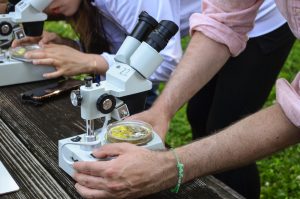
As the years go by, new learning styles become standard practice, and society adapts to those learning styles. Some stay, some are just fads, but one learning style that always seems to be prevalent is social learning.
While you might not know what social learning is by the name, you definitely know it by practice. Social learning is learning with and from others.
What does this mean exactly? Imagine the saying, monkey see, monkey do. This phrase summarizes much of what social learning is, but there’s more to it. Anything that you learn from observing others, or what you are told by others, relates to social learning.
A common form of social learning is through social media. You observe all of the most recent trends, and now know what the most popular shoe is, or which water bottle stays the coldest. Social learning makes up a large amount of the learning you do in everyday life.
Now I know what you’re thinking, what does any of this have to do with STEM? It has everything to do with STEM!
Imagine you are in a lab for your biology class. It’s a big day because your teacher decided to take out the microscopes to examine the plant cells of an onion. You paid attention to the directions, but you are still not sure how to work the microscope properly. Luckily for you, there are three more people at your table using the same type of microscope. At this point you can either observe and see how they work their microscopes, ask them for help, or even ask your teacher for help.
Now I know we went off on a tangent, but all three of these options are examples of social learning. This type of learning is so crucial in being able to use STEM equipment. Often, the tools you use for STEM are very complicated, and require instruction from someone who has experience with that tool. Without social learning, figuring out how to use a microscope, or any other equipment, would be very difficult.
Along with this, we are often told very important information through social learning. Let’s say you are in your chemistry class, and you have a beaker full of water and a large chunk of sodium. If you have already taken chemistry, you know this is bad news. Not knowing the dangers of pure sodium and water, one might just drop the metal into the water, creating a very violent reaction. With a large enough piece of sodium, you could injure yourself and those around you.
This is why social learning is so important. You don’t have to figure out that sodium practically explodes when exposed to water through trial and error. You don’t have to find out that lead is dangerous, and that you shouldn’t expose your bare skin to it. This is all because people have already found this out, and through social learning, have spread their knowledge.
Social learning is extremely important in STEM. It allows us to work off of each other, and learn new things. Without social learning, progression in STEM would be very difficult to achieve.
Written by: Albert Nova
May 28, 2021
